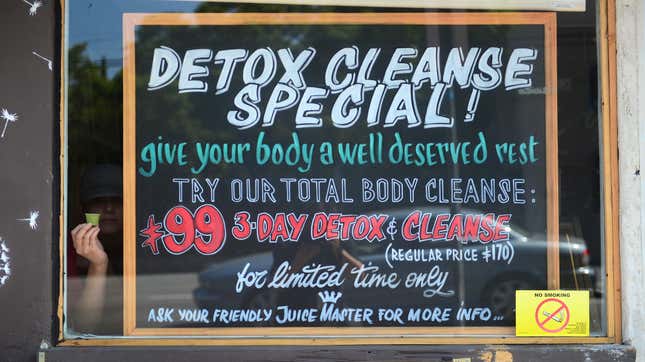
It’s understandable to want a quick fix. Especially after a night of heavy drinking or a weekend of eating only state fair food, the idea of a “detox” might sound pretty appealing. But is a detox anything more than a pure invention by the health food industry to sell you green juice? What’s really the best way to get your body back on track after overindulging? Turns out, you don’t really need any of those fancy diets—your body is pretty good at detoxing itself.
The rise of the detox industry
The practice of using outside methods and products to detox the body dates back thousands of years. Back before we had a better understanding of science and the makeup of the human body, practices like bloodletting, enemas, and fasting were medically prescribed to get toxins out.
Then, in the 19th and 20th centuries, detox products started to become trendy. Laxatives, for example, were being marketed as a legitimate diet supplement—one ad for the horribly named Bile Beans republished in The Conversation features an illustration of a woman looking down at a scale next to the text, “Medically approved Bile Beans taken regularly at bedtime keep you healthy, happy, and slim.” In 1938, one British physician stated that the UK population alone was spending £25-30 million on these products per year.
Things changed a little in 1941, when medicine manufacturers were legally required to list all ingredients on their packages. But soon after, it became less about the products and more about the routine. The Master Cleanse, for instance, was first introduced by Stanley Burroughs in 1941, and has been recycled and repromoted to the population ever since. I remember first hearing about it in the aughts as “Beyoncé’s miracle juice cleanse,” a 10-day routine where the star only drank a mixture of lemon juice, maple syrup, cayenne pepper, and water—yup, that’s Burroughs’ brainchild. While it was originally introduced to help treat ulcers and rid the body of toxins, it soon became co-opted as a weight loss regimen.
According to marketing reports, the detox industry is still on the rise, and by 2026 it’s expected to be a $75 billion industry. Things do look a little different now in the advent of body positivity and diet myth busting. For example, brands like HUM Nutrition dress up their detox products as vitamins and Raw Juicery maintains a health-focused marketing strategy over a weight loss one. Still, scroll through Instagram and TikTok and you still see just as many influencers as ever hawking detox products and diets with before and after pictures and a special promo code in the caption, without showing the unfortunate negative impacts that many of these practices can have on your body.
Harmful side effects of detox diets
The reason that many of these drinks and diets may offer fast results is that they’re dehydrating you. Any immediate weight loss is the result of water weight disappearing; ironically, this is water that your body desperately needs in order to actually detox you. There’s also a widespread misconception that for a detox to really “work,” it must “clean you out,” taking the form of colon cleanses or gut health routines. Again, this dehydrates you and can leave you feeling crampy.
Here are some possible harmful side effects from certain detox products, as well as diets based around specific fruits and vegetables, as outlined by the National Center for Complementary and Integrative Health:
- Some “detox” and “cleansing” juices and supplements haven’t been pasteurized, so there’s a possibility of ingesting harmful bacteria.
- Consuming too much food that is high in oxalate, like spinach and beets, can cause kidney problems.
- Any diet that restricts what you consume leaves you at risk for not getting the nutrients you need.
- Many cleanses and detoxes can lead to dehydration, electrolyte imbalances, and severe diarrhea. (How many times must I beg you not to give yourself diarrhea just because TikTok tells you to?)
What’s more, the NCCIH cites a 2015 review saying there was no compelling evidence that any of these routines actually rid the body of any toxins. Do you really want to put your body through all this for nothing?
How your body actually detoxes
If you have healthy functioning organs, then those are your greatest detox tools, according to Popular Science. Your liver, kidneys, and lungs exist almost exclusively to filter toxins out of your body. If you do want to give those functions an extra boost, the two best things you can do are get more sleep and drink more water.
Remember, your body is always working, even while you’re sleeping, and that’s often the ideal time to really get rid of anything harmful floating around in there. The more sleep the better. And you need to stay sufficiently hydrated to keep your organs working at 100%, so keep the water flowing. In the end, the best detox “diet” won’t cost you a thing.